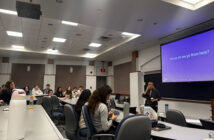In “Carrie Soto Is Back,” a shocked retired 37-year-old professional tennis player watches from the sidelines as upcoming young players threaten to break her records and steal the title she’s sacrificed nearly everything for.
With 20 gram slam wins and countless other records under her belt, Carrie Soto is the world’s No. 1 female tennis player. But she might not hold the spot for long.
Enter Nicki Chan, a 17-year-old British Asian tennis player racing to the top of the leaderboards after Carrie’s retirement. Agile on the court and friendly off of it, Nikki is everything Carrie isn’t.
With a style of play that is slower, yet effective in its own right, and a hostile disposition that lands her the nickname “The Battle Axe,” Carrie feels threatened by Nicki.
Carrie’s cutthroat nature is ever-present throughout Taylor Jenkins Reid’s 2022 novel “Carrie Soto is Back.” Though I found her to be an unlikeable character, I couldn’t help but root for her.
Without a mother figure in her life, Carrie decided to follow in her father Javier’s footsteps and had a tennis racket in her hand before she even started grade school. She dedicated her entire life to the sport, even dropping out of high school before graduation to pursue her dream.
Reflecting on my own competitiveness, I understood Carrie’s disappointment as she watched someone else overshadow her 37 years of hard work and dedication.
What starts as a book simply about redemption turns into an ambitious novel about persistence in the face of criticism, the perils of fame and staying true to oneself. Jenkins Reid also throws a little bit of romance into the mix to lighten the mood.
In the end, whether Carrie defeats Nicki is arguably the least important part of the novel.
After five years out of playing after an injury to her knee, Carrie shocks fans and critics by announcing one final year on the court in an attempt to salvage her reputation.
Enlisting her father’s help as a coach, Carrie pushes through months of merciless training sessions.
Though I didn’t always agree with his coaching style or treatment of Carrie on the court, the relationship between Carrie and Javier is one of my favorite parts of the book. The two warm up to each other, breaking through each other’s tough exterior.
In an effort to prepare her for the harsh competition she is soon to face — and potentially encourage her to open up emotionally — Javier pairs Carrie with Bowe Huntley, a male player similarly attempting to salvage his game in one final season.
Carrie and Bowe butt heads and bicker endlessly before finally recognizing their indistinguishable tendencies to push feelings away out of fear of getting hurt. Apart from Javier, Bowe is the only person to elicit real emotions from the otherwise inexpressive Carrie.
Sports commentators and fans root for Bowe’s comeback just as passionately as they discourage Carrie’s. The tantrums he throws after losses — whipping his racket to the ground and storming off the court — are overlooked, while Carrie’s demeanor is seen as callous and dubs her a “b****” in the sports community.
Even Nicki is criticized for her bold and assertive style of play, as she’s soon nicknamed “The Beast.”
The double standard of patting aggressive male athletes on the back for one thing while denouncing female athletes for that same thing is prominent throughout the story. Jenkins Reid’s subtle allusions to the real-world issue of the disapproval of “unfeminine” athletes make this novel feel more authentic.
One downside of the novel is that it’s brimming with tennis lingo, some of which the average reader might find slightly confusing. Luckily, my brief stint on the court in fourth grade and my once-yearly family tennis tournament helped me grasp the tennis-centered jargon.
With understanding of how scoring of the game worked and the different types of shots a player can make, I appreciate the play-by-plays included throughout the story. I found myself picturing the matches in my head, as Jenkins Reid’s illustration of the back-and-forth across the net was depicted with such exhaustive detail.
Just as she did with “Daisy Jones and the Six,” “Malibu Rising” and “The Seven Husbands of Evelyn Hugo”, Jenkins Reid has left me yearning for another thought-provoking novel. However, one focused on something other than celebrities would be a welcome addition to the collection.
I give “Carrie Soto is Back” 4/5 stars and am anxiously awaiting a film adaptation.






Comment policy
Comments posted to The Brown and White website are reviewed by a moderator before being approved. Incendiary speech or harassing language, including comments targeted at individuals, may be deemed unacceptable and not published. Spam and other soliciting will also be declined.
The Brown and White also reserves the right to not publish entirely anonymous comments.
1 Comment
The word you’re looking for is “indomitable.” “Unputdownable” is not a real word.